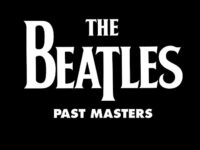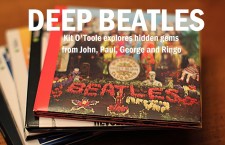An unlikely b-side to the Beatles’ more commercial “Lady Madonna,” “The Inner Light” represents George Harrison’s ongoing experiments with bridging the rock and Indian music genres. More importantly, it exemplifies Harrison’s impressive growth as a songwriter, expanding upon philosophies previously expressed in “Love You To” and “Within You Without You.” “The Inner Light” can be seen as the final episode in a trilogy, the three songs providing spiritual guidance on how to achieve self-awareness and enjoy the quest for knowledge.
January 1968 became a particularly significant month in Harrison’s career; right before recording “The Inner Light,” he traveled to India to work on the Wonderwall soundtrack. The ambitious project holds a notable place in Harrison and Beatles history: it was George Harrison’s first solo release (and the first solo release by any Beatle) as well as the first album issued by the new Apple label. Wonderwall symbolizes Harrison’s desire to blend Eastern and Western influences, and “The Inner Light” is an offshoot of that artistic goal.
The song’s origins date to October 1967, when Harrison and John Lennon made their second appearance on the Frost Programme to discuss Transcendental Meditation. One of the other guests was Juan Mascaró, a Sanskrit scholar at Cambridge University; striking up a friendship with Harrison, Mascaró subsequently sent the musician a copy of his book Lamps of Fire. In it was a passage from chapter 47 of the Tao Te Ching; Mascaró highlighted the section and suggested that Harrison should set the words to music. The original version reads as follows:
Without taking a step outdoors
You know the whole world;
Without taking a peep out the window
You know the colour of the sky.The more you experience,
The less you know.
The sage wanders without knowing,
Sees without looking,
Accomplishes without acting
George Harrison decided to base his lyrics on this passage. Meanwhile, Harrison wrote and recorded the Wonderwall soundtrack, flying out to Bombay, India on January 7, 1968 to complete sessions with local musicians. During this time Harrison also had the musicians perform several ragas for possible use for Beatles songs. Thus, the basic track for “The Inner Light” was completed during this five-day period.
The Beatles resumed work on “The Inner Light” on February 6, when Harrison returned to Abbey Road to complete his lead vocals. According to Mark Lewisohn’s Complete Beatles Recording Sessions, Lennon and Paul McCartney had to persuade Harrison to sing the track. “George had this big thing about not wanting to sing it,” tape operator Jerry Boys says, “because he didn’t feel confident that he could do the song justice. I remember Paul saying, ‘You must have a go; don’t worry about it, it’s good.”
According to the Beatles Bible, producer George Martin and engineer Geoff Emerick first copied the original two-track tape made in India onto four-track. Next, Harrison laid down his lead vocals and had a musician overdub a shehnai, or Indian reed instrument, onto the track.
The group completed work on “The Inner Light” on February 8; Harrison double-tracked his vocals on the “arrive without traveling” lyric, and John Lennon and Paul McCartney contributed harmonies to the “do all without doing” line. Once Martin, Emerick, and Ken Scott completed the mono mixes, “The Inner Light” officially became the other side of the “Lady Madonna” 45 — the first time a Harrison composition appeared on a Beatles single.
While the instrumentation is an obvious standout — the percussion immediately demands the listener’s attention — it’s Harrison’s vocal performance and insightful lyrics that propel the track. Harrison’s lilting voice carries the melody, which McCartney once praised: “Forget the Indian music and listen to the melody. Don’t you think it’s a beautiful melody? It’s really lovely,” he said in 1968. The statement “forget the Indian music” may be a bit harsh, particularly since the Eastern influences underscore the very concept of “The Inner Light.” Inner peace, tranquility, and wisdom can only be found in oneself, the lyrics argue, and the quest for wisdom is never-ending.
A drone begins the track, followed by the harmonium and percussion from the pakavaj and tabla. As the instrumentation rises in volume and intensity, it suddenly falls out to just the flute, sitar, and gentle percussion, with George Harrison’s voice imitating the sitar as it delivers the central message.
“Without going out of my door, I can know all things on earth,” he softly sings. However, he drops to a lower range as he adds a caveat: “The farther one travels, the less one knows.” In other words, one can never attain ultimate knowledge: It is a lifelong quest that may result in increased self-awareness and deeper understanding. As the instruments return to form what resembles the bridge, Harrison’s double-tracked vocals summarize the purpose of meditation: “arrive without traveling.” That’s when Lennon and McCartney, likely in an effort to make sure listeners fully grasp the concept, do the aforementioned harmonizing with Harrison on the line “do all without doing.”
As for the role of “The Inner Light” in a trilogy, remember that the Beatles’ earlier “Love You To” contains a “seize the day” message, while “Within You Without You” directly challenges the listener: “and the people who gain the world and lose their soul, they don’t know, they can’t see — are you one of them?” The latter Sgt. Pepper track urges the audience to “see beyond yourself” and realize “we’re all one.”
To compete this life-changing trilogy, “The Inner Light” advises listeners to look inward, to gain self-knowledge through reflection. After all, as Harrison warns in “Within You Without You,” “try to realize it’s all within yourself. No one else can make you change.” We may all be one, but we must find truth by meditation and deep reflection.
Concise yet vivid phrases such as “arrive without traveling” perfectly capture the essence of philosophy: learning through reflection and an awareness of one’s role in the universe. While George Harrison admits that one may never achieve all knowledge, his words in “The Inner Light” encourage listeners to find pleasure in the journey.
- The Rescued Early Paul McCartney Song That Completed ‘Beatles For Sale’ - December 4, 2024
- A Rare Beatles Cover Proves John Lennon Was Wrong About His Voice - November 26, 2024
- How John Lennon Came Roaring Back on the Beatles’ White Album - November 22, 2023




The Inner Light is one of those hidden pre-CD Beatle songs. There was a list of songs that were almost impossible to get in the US without owning the single. Until the US version of RARITIES came out, I don’t think the Inner Light was on any LPs.
I always felt Paul’s comment was a big backhanded compliment… It was uncalled for. I’m sure he thought he was saying something positive about it, trying to explain it to people who were unused to Indian music, but it comes off as wrong.
But the Inner Light is one of George’s finest. In my opinion, the best Indian song with a Western flavor, that was ever done. And it is George’s best religious song. It doesn’t hit you over the head. It’s just good philosophy.
Here’s the Tribute version from the “Concert For George” with Jeff Lynne on vocals and Anoushka Shankar on sitar. https://www.youtube.com/watch?v=dTedxEyc8PA
Thanks for commenting, Siegel! Yes, I agree that the “forget the Indian music” remark definitely came off wrong. And yes, I do remember hearing it on the Rarities collection as well–it was only a B-side before that.
I have nothing against how George was incorporating a new musical or religious culture, but I feel terrible that the he got such a small number of tracks on Beatles albums. He wrote some great rock, but so much of it was wasted acts of protest like “Northern Song,” or “Not Guilty” (Anthology 3) which were anti-Beatles, or pointedly religious experimentation which he had as an only track on some albums. Lennon was able to make some more popular songs explaining his views in a brief, memorable way. I think Harrison’s solo work shows a sad man more frequently than a message man. Phil Spector helped neither of them, and imitating The Band’s Music at Big Pink is the death of really good sounding rock music around 1970, such as performed by Harrison on “My Guitar-” and “Something.” Sleepy time rock after the Beatles with all those great compositions on All Things Must Pass. He also put down an album while ill (Dark Horse), two by-the-numbers records which sarcastically adopt 80s tropes (Somewhere in England and Gone Troppo) [The point is driven home in “Blood From A Clone,” from the first album]. Too much talent not to overcome all these understandable frustrations.